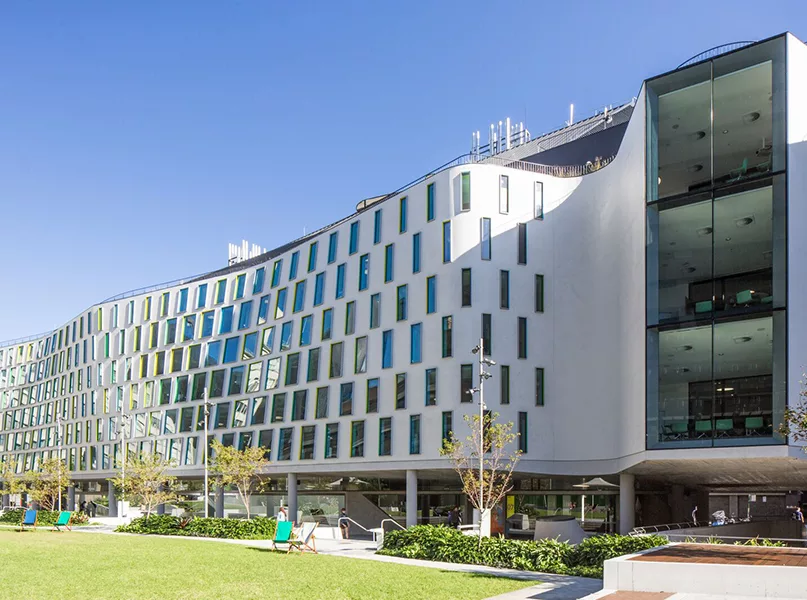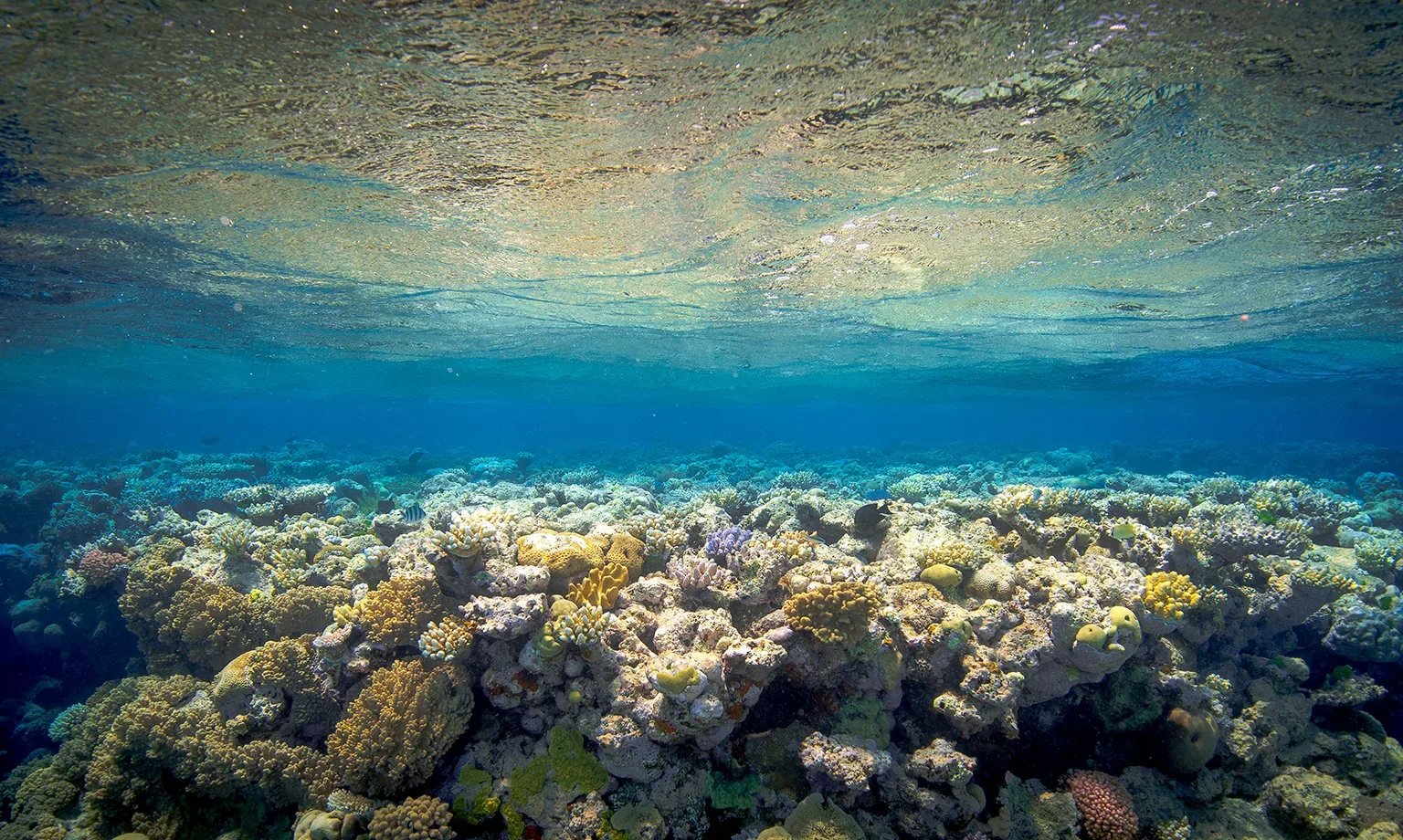Climate Change Cluster and UTS Rapido are proud to showcase a remarkable breakthrough in coral research capabilities with a state-of-the-art modular coral bath system designed to significantly impact Australian conservation efforts. We speak to University of Technology Sydney’s team members to learn more about this groundbreaking new development.
UNVEILING THE FUTURE OF CORAL RESEARCH
Coral reefs are vital not only for marine biodiversity but also for human life. Approximately one billion people benefit directly or indirectly from the ecosystem services provided by coral reefs, such as food and tourism. Yet, the future of coral reefs is under severe threat due to rising ocean temperatures.”
As highlighted by Dr Emma Camp, Team Leader of the Future Reefs Team at the University of Technology Sydney (UTS), coral reefs are crucial to the infrastructure of the planet and its residents.
However, as indicated in the 2022 Intergovernmental Panel on Climate Change (IPCC) report, it is predicted that a global temperature increase of 1.5 degrees Celsius could lead to the loss of between 70 to 90 percent of reef-building corals.
This situation is compounded by increasingly frequent coral bleaching events, where corals expel the symbiotic algae that nourish and colour them, leading to their starvation and death.
“While addressing climate change is the only way to secure a future for coral reefs, strategic intervention and restoration efforts aim to buy time for reefs as they contend to survive increasingly adverse environmental conditions,” continues Dr Camp.
This is exactly where Climate Change Cluster (C3) provides its expertise.
A research institute within the Faculty of Science at UTS, C3 brings together a range of research teams, including the Future Reefs Team, all of whom focus on different aspects of marine and aquatic ecosystems and share a common objective of advancing the understanding of aquatic plant and microbe ecosystems, which are vital to global well-being.
“C3’s work focuses on generating insights into the relationship between human activity, climate change, and marine ecosystems,” details Dr Camp.
“This research informs policies and innovations that have real-world impacts on communities, governments, and industries. Our core areas of research include algae biotechnology, coral reef restoration, ocean microbiology, and coastal ecosystem productivity.”
The Future Reefs Team, specifically through initiatives like the Coral Nurture Program (CNP), showcases how collaboration between scientists, stakeholders, and communities can support the restoration of high-value reefs such as the Great Barrier Reef.
This collective action is critical for protecting such ecosystems and the communities that rely on them. The effort to maintain, rehabilitate, and restore the health of the world’s reefs is enormous, requiring coordination between governments, industries, and communities alike.
“At UTS, we are demonstrating how R&D innovation, engineering, and IT can be harnessed to advance reef conservation. By integrating novel technology into restoration practices, we can support the many stakeholders who rely on these vital ecosystems and create more effective, scalable solutions for the future,” insights Hervé Harvard, Executive Director, UTS Rapido.

“UTS is a global leader in sustainability research, with a focus on finding solutions to the world’s wickedest problems. We’re so excited about the new MTP device. It will not only deliver a higher throughput of coral experimentation but will also greatly help coral selection in restoration efforts of our beautiful reefs in a hotter world”
Christian Turney, Pro Vice-Chancellor of Research, University of Technology Sydney
IMPROVING CORAL RESILIENCE
Dr Camp is not only passionate about her work with the future of corals but is a National Geographic Explorer and Australian Academy of Sciences’ STEM Women Changemaker, ultimately aiming to communicate research to engage society in becoming part of the solution for a sustainable Earth.
Harvard founded UTS Rapido in 2016, intending to bridge the gap between academia and industry through innovative R&D, collaborating across sectors like healthcare, infrastructure, and sustainability.
“My passion lies in using technology to drive impactful solutions and empowering organisations to advance innovation,” expands Harvard.
“This vision drives ongoing collaborations, such as supporting research on marine ecosystems with Dr Camp, partnering with the UTS Institute for Sustainable Futures on sustainability issues, and supporting many social impact organisations.”
For the coral restoration project with the Future Reefs Team, Harvard and his R&D team at UTS Rapido worked closely with Hadley England, PhD student and Project Lead, to realise his vision and develop the Modular Multi-Taxa Phenoplate (MTP) prototype.
The MTP project was conceived after it became apparent that new tools were required to support choice selection in reef restoration, particularly in regards to thermal tolerance.
Working with Dr Andrei Herdean, an expert in photosynthesis and temperature regulation, the team spearheaded the creation of the MTP by integrating technologies with a long history in agricultural phenotyping that have not been transferred to marine sciences.
This innovative system allows for precise temperature control and rapid assessment of coral populations’ resilience to future ocean conditions, ensuring the team can identify and focus on those best suited to survive.
“With global commitments to restore high-value reef sites, we plan to use this advanced technology as one of our tools to guide our restoration efforts,” details England.
This next-generation equipment marks a significant advancement in coral reef technology as it integrates features like fluorometry and oxygen measurement, allowing for precise testing of coral thermal resilience.
“The MTP allows us to control environmental conditions like temperature and nutrients, which are crucial for understanding how coral species respond to stress. Having a technology that allows us to do this rapidly and in the field is incredibly exciting,” enthuses Dr Camp.
The system is designed with custom well-plates of different sizes and materials to ensure uniform temperature distribution, resulting in 16 individual watertight wells that allow high-throughput testing and precise manipulation experiments.
The MTP is designed to be cost-effective and scalable for global use, and unlike traditional tools developed for terrestrial organisms, the device is tailored specifically for marine environments.
“By identifying the corals most likely to withstand future conditions, we can ensure that our time, effort, and resources are directed towards the most promising candidates for restoration, ultimately increasing the chances of success in preserving these vital ecosystems,” asserts England.

SUSTAINABLE TECHNOLOGY SOLUTIONS
UTS serves as the ideal place to conduct such a project, as it is renowned for its sustainability research and strong focus on developing solutions in environmental science, climate change, and public policy.
“With our diverse expertise in engineering, science, and technology, UTS fosters a collaborative environment where projects like this can thrive,” details Harvard.
The collaboration between UTS Rapido and C3 leverages the strength of both entities, combining innovative engineering with advanced marine science. Specifically, the insights gained from the Future Reef Team’s research are critical to aid effective coral reef restoration programmes that further enhance reef resilience.
The team utilised principles of high-throughput phenomics screening, widely used in sustainable agricultural practices.
These techniques offer valuable insights for coral restoration, as phenotyping in agriculture is used to identify crops best suited to withstand environmental stressors like drought or heat. While the marine environment poses its own unique challenges, the fundamental concept remains the same.
“Just as sustainable agriculture informs planting and crop decisions, our system helps guide coral restoration efforts in the face of climate change. We aim to use this, alongside other tools and expertise, to contribute to the overall sustainability of coral reef ecosystems,” explains Dr Camp.
As one of the key challenges in large-scale aquarium research is controlling nutrients like trace metals – which are widespread in the environment and significantly affect research outcomes – accurately replicating environmental conditions for coral studies is of critical importance.
To address this, Dr Michael Behrens, Principal Delivery Manager of Mechatronics for UTS Rapido, worked to ensure the new equipment featured a closed, bespoke, non-metal system to limit metal contamination.
“It provides precise control over nutrient and temperature conditions in each pod, ensuring coral resilience and responses to environmental changes can be studied with high accuracy under controlled conditions,” he informs.
Such a high level of management is imperative for reliable testing and experimentation.
“This equipment not only enhances research capabilities within UTS but also serves as an invaluable resource for the wider scientific community and commercial sectors, broadening our impact”
Hervé Harvard, Executive Director, UTS Rapido
ADVANCING CORAL RESEARCH CAPABILITIES
Ongoing climate change makes it difficult to remove environmental stressors entirely, so researchers and local communities alike must focus on boosting reef resilience.
The marine science and sustainability communities are working together to develop new approaches that go beyond traditional conservation efforts, with resilience-based management being of high importance.
This approach uses research to make informed decisions about where, when, and how to intervene, incorporating factors such as environmental history and site accessibility.
“By integrating technology and expertise from across disciplines, we hope to improve the effectiveness of reef restoration projects worldwide,” voices Dr Camp.
As the Future Reef Team and UTS Rapido continue to look towards the future of marine sustainability, they are excited about the potential impact of the MTP system on coral conservation in Australia.
“With further funding, we plan to refine and replicate this prototype for use in other research locations. The high-throughput nature of the device makes it a versatile tool, not only for coral research but also for studying other marine species, such as oysters,” enthuses England.
This broad application is crucial as it allows researchers to enhance the understanding of how various aquatic species respond to climate change, supporting a more comprehensive approach to marine conservation and climate resilience.
The future applications of this new system are especially promising within the Future Reef Teams’ CNP, which actively engages in reef restoration through collaboration with Traditional Owners and tourism operators.
“Looking ahead, we are focused on future-proofing community restoration practices, assessing long-term ecological impacts, and supporting grassroots initiatives across the Indo-Pacific,” asserts Dr Camp.
The Future Reefs Team is dedicated to understanding how environmental changes impact the coral holobiont – the coral and its associated microbial communities. Its research spans from molecular-level interactions to broader ecological dynamics, focusing on developing technical solutions that inform reef management and restoration.






















